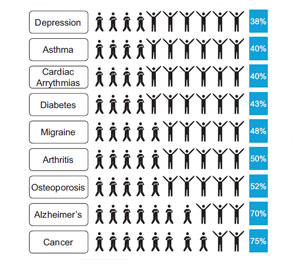Pharmacogenomic Testing » in Wilmington, NC
Physicians and Providers at Pelican Family Medicine believe in the power of preventative medicine, however we acknowledge that many patients join our practice with pre-existing conditions. As a portion of our new patient protocol, we encourage all patients who are on existing prescription medicines to undergo pharmacogenomic testing.
Pharmacogenomic testing is performed by a simple cheek swab and can provide us with a wealth of information about your health and the effectiveness of any current medications. Pharmacogenomics testing can also provide us with a roadmap for any future prescriptions. This test will be recommended for patients who may need a prescription so that we can ensure they are not incurring unnecessary monthly prescription costs or taking drugs they may not need. Please read the following advertorial below for more information on this testing and why it is a standard practice at Pelican Family Medicine!
Are Your Medications Hurting You?
Did you know that Adverse Drug Reactions (ADRs) are the 4th leading cause of death in the USA ahead of diabetes, AIDS, pneumonia and accidents, according to the FDA? Did you know that there now is a test available to help your health care provider get the right dose of the right drug for you?
What is pharmacogenomics?

Percentage of patients for
whom drugs are ineffective.
Pharmacogenomics (PGx) has been characterized as “getting the right dose of the right drug to the right patient at the right time.” Pharmacogenomics is the study of variations of DNA and RNA characteristics as related to drug response. It is one of the most exciting areas of personalized medicine today. The field arises from the convergence of advances in pharmacology (the science of drugs) and genomics (the study of genes and their functions). Patients typically have variability in response to many drugs that are currently available. It can be difficult to predict who will benefit from a medication, who will not respond at all, and who will experience adverse effects. PGx seeks to understand how differences in genes and their expression affect the body’s response to medications. More specifically, PGx uses genetic information to help the clinician identify responders and non-responders to a drug, and predicting the efficacy and/or toxicity of a drug.
Advances in PGx have opened new possibilities in drug discovery and development. PGx has allowed for more tailored treatment of a wide range of health problems, including cardiovascular disease, cancer, and HIV/AIDS. FDA’s Center for Drug Evaluation and Research (CDER) has supported pharmacogenomics for more than a decade.
What Genes are commonly involved in drug metabolism?

There are several genes responsible for differences in drug metabolism and response. Among the most common are the Cytochrome P450 (CYP) genes, encoding enzymes that control the metabolism of more than 70 percent of prescription drugs. People who carry variations in certain CYP genes often do not metabolize drugs at the same rate or extent as in most people, and this can influence response in many ways. Other genes known to affect drug response encode the receptors for regulatory molecules such as neurotransmitters, hormones, cytokines and growth factors, and cellular proteins such as enzymes, transporters, carriers, ion channels, structural proteins and transcription factors. Variations in these genes can lead to poor response and adverse drug reactions by disabling, inactivating, interfering with, or inaccurately inducing the signaling mechanisms or cellular machinery that must function for the body to respond properly to the drug; or by causing side effects that prevent continued use of the drug.
Did you know some foods cause altered medication metabolism?
Certain foods mimic the effect of genetic variations, effectively causing changes in medication metabolism. One of the most common examples is grapefruit juice, which is an inhibitor of CYP3A4. In people regularly drinking grapefruit juice, drugs that require the activity of CYP3A4, such as diazepam, will not be metabolized at the same rate as in most people.
How can you get tested? Call our office today at (910) 792-1001 to schedule an appointment. Many insurance companies cover the cost of pharmacogenomic testing.


